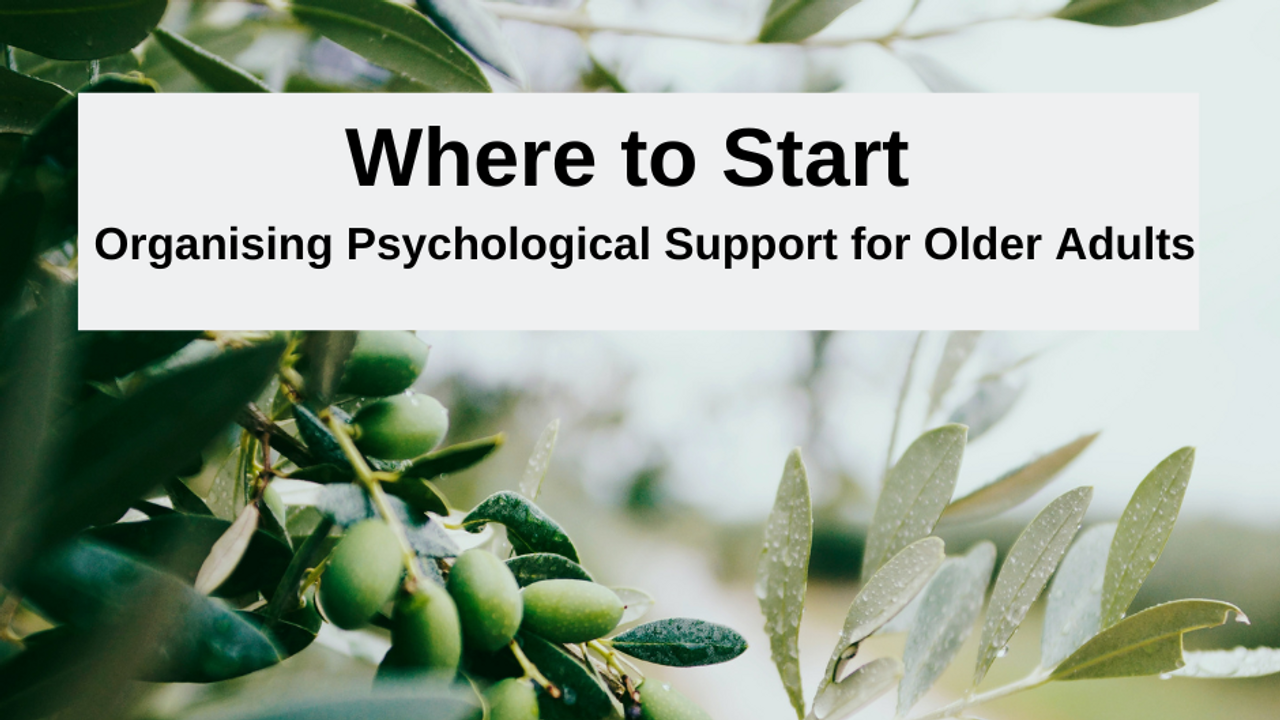Where to Start - Organising Psychological Support For Older Adults
Jun 29, 2022
Where to Start – Organising Psychological Support for Older Adults
Can you please help? How do we find a psychologist for our elderly client?
Despite not routinely offering delivery of psychological services, as a registered psychologist I am often contacted for help in organising psychological support for an older person who may be experiencing emotional changes.
There aren't many clinicians who work with older adults in private practice and those who do perhaps do not promoted themselves and their business. I certainly remember the challenges of marketing my business a decade ago when Wise Care was purely a psychological services based business. The recent requests for recommendations often stop me in whatever else I may be doing and cause me to reflect on the huge journey undertaken since then as I acknowledge the increased awareness on the importance of mental wellbeing in late life. Finally, we are getting there.
Today, more than ever, we are having open conversations about mental wellbeing in late life. Awareness for its treatment with psychological interventions, particularly for those who may be experiencing late onset depression with no prior history of mental illness has increased and there is growing insight that perhaps the reduced appetite, feelings of helplessness and sleep changes in older adults may in fact be signs of depression.
There are many services which do not require GP referral and in some instances a referral to a psychologist may not be the most appropriate option. So, where do we start?
First Things First
Recognising that an older person may require support with their emotional wellbeing is usually a process which requires us to take a step back, reflect on our recent interactions and recognise that perhaps there is a pattern of behaviour to suggest the person may require additional support. The person may not be themselves, they may be experiencing increased isolation, worry, changes in their eating and sleep patterns and feelings of hopelessness and helplessness to name a few.
We do not jump to conclusion that someone is depressed because they are having a bad day, and we certainly do not label someone as being anxious if they are experiencing acute stress.
Mental health conditions are routinely diagnosed by a GP or a qualified mental health professional. In our day-to-day interactions we need to be careful around the labels we use when supporting a client and to be even more careful in how we may suggest their need for psychological service. Older adults are the least likely age group to use psychological services due to ageism, stigma and fear. Avoid using labels and making diagnosis, unless you are qualified to do so, and even then be mindful of the way you interact and convey the message. Mental health conditions are treatable and we need to reassure an older person that they too can experience improved emotional wellbeing outcomes regardless of their age or health status.
What Works for Mental Health in Late Life
Support for mental health conditions may include counselling with a qualified mental health professional, antidepressants prescribed by a GP or a specialist and lifestyle changes.
Often the best outcomes are achieved through a combination of medication review, counselling and lifestyle changes.
Some clients may be at risk of developing mental health conditions, but not yet meet a formal diagnosis. In those instances it is important for the older person to be monitored and offered support with social engagement, scheduling pleasant events and ensuring they are participating in some type of exercise.
Lifestyle factors can be as important as counselling and taking antidepressants. Changing our routines, improving activity levels and engagement, introducing healthy sleeping patterns, eating regular and nutritious foods and exercise are vital for longevity and our mental health.
Counselling can be delivered by a range of qualified mental health professionals. This includes psychologists, social workers, occupational therapists specialising in mental health, nurses with special qualifications in mental health and rehabilitation counsellors. Counsellors without tertiary qualifications may also be helpful, however their level of training is usually at a lower level and therefore consultation with a counsellor may not attract a Medicare rebate.
Medication can only be prescribed by qualified medical professionals. The usual approach is to start slow and to watch for side effects. It can take some weeks before medication starts to work and for older people the most dangerous side effects include drowsiness which can increase the risk of falls.
What About Prevention?
Assisting an older person to minimise the risk of developing mental health conditions is important and something that often requires a team approach. It is usually easier and more effective to deliver support sooner and prevent development of a mental health condition than to ignore the symptoms and seek support when a person may already be experiencing advanced symptoms.
Some of the risk factors to developing a mental health condition for an older person can include: changes in physical health, diagnosis of dementia, being in a new environment, financial stress, changes in their support network, side effects of medication, reduced mobility, and changes in roles and responsibilities.
Preventative strategies are used to boost an individual's resilience and improve coping mechanisms. These may include: exercise, social interactions, pet therapy, scheduling pleasant events, community engagement, music therapy, arts and craft.
WISECARE's award-winning Wellness Adventure Program is designed to boost resilience and enhance wellbeing in the elders in our care who may be at risk of developing mental health conditions. This program is offered by WISECARE on a licence base with aged care and retirement living providers and more information can be found HERE. The Wellness Adventure program cannot be licensed to individuals.
Treatment Options
Treating mental health conditions usually requires a team approach. Historically, mental health conditions in older people in particular, focused only on a medical approach, generally by prescribing antidepressants. However, pills alone cannot replace human interactions and help an older person to boost their social interaction.
Psychologists are trained professionals in helping individuals overcome mental health conditions. Treatments used include psycho-education which includes motivational interviewing, and cognitive-behavioural therapy, which includes behavioural interventions, behaviour modification, exposure techniques, activity scheduling, cognitive interventions, cognitive therapy, relaxation strategies, social skills training, communication training, interpersonal therapy, narrative therapy (for Aboriginal and Torres Strait Islander people) and Eye-Movement Desensitisation Reprocessing (EMDR).
Rebates:
Rebates for psychological services include Medicare schemes such as chronic disease management, Better Access to Mental Health and rebates through private health insurance.
The most popular program for Medicare rebates is the Better Access to Mental Health. Through a valid GP referral, every Australian is entitled to psychological support, delivered in person or via telehealth, through Better Access to Mental Health incentive. This program allows substantial rebates for treatment, and in some instances individuals may be bulk-billed for service. At the time of writing, a person may be entitled for up to 20 consultations in a calendar year.
Non-GP based services
Swinburne University – Wellbeing Clinic for Older Adults
The Swinburne Wellbeing Clinic for Older Adults has been operating for more than a decade as a not-for-profit counselling and support service for the residential aged care community. Their counsellors are provisionally registered psychologists, social work interns and counselling postgraduates, who are supervised by experienced practitioners. They offer support via phone or video calls. Complete a referral to request service HERE
Lifeline
If we feel that the older person has expressed suicidality, or that they may be at risk of harm to themselves, it is important to escalate those concerns as soon as possible. Providers such as Lifeline may be helpful in those instances where an older person may need to speak with someone immediately to ensure their safety – please call them on 13 11 14. Did you know that every 30 seconds, a person in Australia reaches out to Lifeline for help?
Aged Care Grief and Bereavement Support
Australian Centre for Grief and Bereavement (ACGB) offers a range of supports for aged care residents, home care recipients, their families, friends, community workers and residential aged care staff and external organisations associated with aged care. Find out more about them HERE
How can Wise Care help?
Download our FREE resources
Fast-Track Your Engagement With the Elderly – Download This Easy and Effective Tool FREE.
Five Facts About Me is an easy, fast and effective exercise in getting to know the elders in your care. It is useful for elders who live in their own homes and those in residential care settings. This popular resource has been updated recently and incorporates a strength building activity, which is discussed in detail in our signature workshop Enhancing Emotional Wellbeing in Late Life. Download it HERE
Purchase the Book
Beyond the Reluctant Move is essential reading for the aged care workforce, family members and loved ones who believe every older person deserves to be heard, understood and loved. Buy it HERE.
Complete a Workshop
Learn more about grief and loss in late life or how to enhance emotional wellbeing in late life. All our workshops are fully self-paced with unlimited access to the online learning platform for the life of the course. Check out our workshops right HERE
You can use this section to send people to one of your evergreen offers.
FREE GUIDE Claim Your Free [Resource Type] - [Freebie Title]: [Brief Description] for [Desired Outcome] Enter your details to get your hands on this free guide.
We hate SPAM. We will never sell your information, for any reason.



